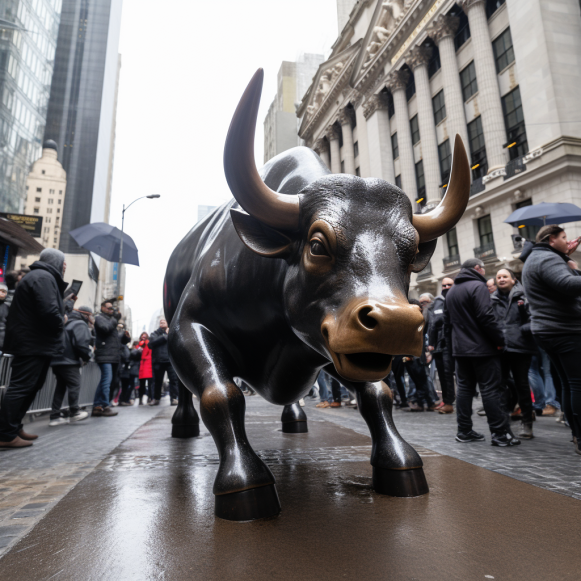Here’s why some of Wall Street’s biggest bulls are still calling for a recession in 2024 — and 4 investments they recommend right now

- Two investment firms expect a recession next year even as US stocks reach record highs.
- BMO Capital Markets and Deutsche Bank shared how a slow economy and a strong market can coexist.
- Here are four market sectors that investors should gravitate toward heading into 2024.
The US economy will enter a recession in 2024, after a year of steady, resilient growth.
That’s not a bearish warning; it’s the latest message from two of Wall Street’s most bullish investment firms.
The consensus on Wall Street is that stocks will post solid gains next year as the US economy expands, just a year after a downturn was widely expected.
However, economists at BMO Capital Markets and Deutsche Bank predict a mild contraction in growth by the end of 2024, even though market strategists at both firms predict the S&P 500 will rise 12% to 5,100.
Expect earnings to drive markets higher — not rate cuts
Bulls are rarely pessimistic about economic growth, which is typically associated with higher corporate earnings and, by extension, higher equity returns.
That began to change in 2023, when investors began to perceive good news as bad news, and vice versa.
Markets saw strong economic or inflation data as a threat to stocks because it supported high interest rates, which drag down earnings multiples. Weaker readings, on the other hand, were thought to justify fewer rate hikes and, eventually, even valuation-boosting rate cuts.
Some market participants are so desperate for lower interest rates that they would welcome a recession. While rate cuts would benefit stocks, negative growth has historically been a major drag on profits.
“Rates don’t peak for good reasons — they peak for sad reasons for equity investors,” said Chris Grisanti, chief equity strategist at MAI Capital Management, in mid-November.
However, BMO and Deutsche Bank are not overly optimistic because they believe interest rates will be cut soon. In fact, while BMO believes interest rates will fall in the second half of the year, Deutsche Bank does not expect them to fall in 2024.
“While we see disinflation continuing, we expect the ghost of 1970s inflation recurrence and the Fed’s own past reaction function precluding any significant rate cuts unless and after growth slows significantly,” said Binky Chadha, Deutsche Bank’s US equity strategy chief, in a note about his 2024 outlook.
BMO and Deutsche Bank both believe that higher profits will drive stock returns next year, even if economic growth disappoints.
According to BMO, earnings will grow by 13.6% despite a “recession in name only,” which means there will be a brief economic contraction without a significant increase in unemployment.
“Labor market data continues to be remarkably resilient,” wrote Brian Belski, the firm’s chief investment strategist, in a note about his 2024 outlook.
In a weaker economic environment, Deutsche Bank expects double-digit profit growth.
“For 2024, the house economics view with a mild short US recession implies $250 (+10%),” Chadha wrote of S&P 500 earnings. “If instead we get somewhat above-trend GDP growth, which was exceeded in the last five quarters, we see EPS of $271 (+19%).”
While BMO’s lack of concern about the economy stems from continued labor market tightness, Deutsche Bank believes that a downturn is already priced into stock valuations. Because markets are forward-looking, investors may not blink if a mild recession occurs in 2024.
“Expect a muted selloff around the slowdown/recession,” wrote Chadha. “As we have argued, given that it is widely anticipated, and expected to be mild and short, we see only a modest short-lived selloff.”
4 top sectors to target now
Although both BMO and Deutsche Bank believe a recession is more likely than not, they advise diversifying portfolios to capture upside in a wide range of scenarios.
“We believe investors will need to own a little bit of ‘everything’ and not tilt too far in one direction or another from a sector, style, and size perspective — a sharp contrast to the trends that prevailed during 2023,” Belski wrote in an email.
BMO’s preferred industries for 2024 are finance and information technology.
Investors are wary of financial firms following this year’s regional bank crises, which have made the group cheaper than at any point since 2009, according to Belski. He wrote that financials are the best value in markets, and that large companies in the sector are especially appealing.
Belski wrote that technology stocks have carried the market this year and can do so again in 2024. He prefers “consumer staples tech” names, which offer goods and services that are valuable in any environment, including a weak economy.
Deutsche Bank agrees with BMO’s call on financials and is also overweight the materials and consumer cyclicals sectors, which are unusual bets if growth slows. However, Chadha argued that they have already priced in negativity and will benefit from a quick rebound.
“We remain overweight the financials as well as consumer cyclicals as they are already priced for a recession and the biggest beneficiary of an eventual recovery,” Chadha said in a statement. “We turn overweight materials on a growth-up and dollar-down cycle.”
Surprisingly, the German firm is underweight defensive sectors for the time being, at least until bond yields fall. Due to their stretched valuations, Chadha and company are also neutral on tech names, particularly large-cap growth, as well as stocks in the energy and industrials sectors.




